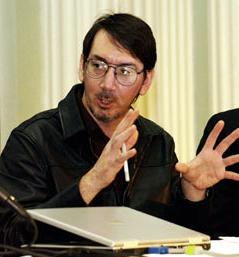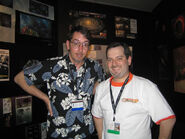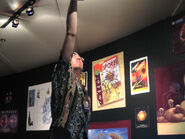
|
Will Wright is a Featured Article
"Will Wright" has been featured, meaning it was deemed an article of interest by the Community.
|

Will Wright, Game Designer
William R. "Will" Wright (born January 20, 1960) is a computer game designer from the US and is co-founder of the game development company Maxis. He was the original designer of the two groundbreaking computer games: SimCity and The Sims. His most recent project is Spore, a simulation that allows the player to influence the development of a life form from a single-cellular stage, through multi-cellular life in the oceans and on land, to the development of sapience and tool-use, and eventually interplanetary and interstellar flight.
Biography[]
Will Wright was born in Atlanta, Georgia in 1960, where he lived until the age of nine, when his father died. He is of French, English, Italian, and Native American descent. His mother moved the family to her hometown of Baton Rouge, Louisiana. After graduating from high school at 16, he enrolled in Louisiana State University, later transferring to Louisiana Tech and then the New School University. Starting with an architecture degree, followed by mechanical engineering, he became interested in computers and robotics. After five years of college, Wright did not attain a degree.
In an interview published in February 2003, Will claims that games were absorbing so much of his time, he decided that perhaps making games was the way to go. Wright's first game was the helicopter action game Raid on Bungeling Bay (1984) for the Commodore 64. Wright found that he had more fun creating levels with his level editor for the game than he had while actually playing it. He created a new game that would later evolve into SimCity, but he had trouble finding a publisher. The structuralist dynamics of the game were in part inspired by the work of two architectural and urban theorists, Christopher Alexander and Jay Forrester.
He hopes to inspire others to take risks in game creation. In his spare time, Will Wright collects leftovers from the Soviet space program.
“I'm interested in the process and strategies for design. The architect Christopher Alexander, in his book Pattern Language formalized a lot of spatial relationships into a grammar for design. I'd really like to work toward a grammar for complex systems and present someone with tools for designing complex things.”
- - Will Wright, from an interview with Wired magazine, 1994.
Maxis[]
In 1986, he met Jeff Braun, an investor interested in entering the computer game industry, at what Wright calls "the world's most important pizza party." Together they formed Maxis the next year in Walnut Creek, California. SimCity (1989) was a hit and has been credited as one of the most influential computer games ever made.
Following on the success of SimCity, Wright designed SimEarth (1990) and SimAnt (1991). He co-designed SimCity 2000 (1993) with Fred Haslam whilst in the meantime Maxis produced other "Sim" games, including SimTower, SimFarm, SimTown and SimHealth to name a few. Wright's next game was SimCopter (1996). Although none of these games were as successful as SimCity, they further cemented Wright's reputation as a designer of "software toys" — games that cannot be won or lost. In 1992, Wright and his family moved to Orinda, California near the San Pablo Reservoir.
Maxis went public in 1995 with revenue of US$38 million. The stock reached $50 a share and then dropped as Maxis posted a loss. Electronic Arts bought Maxis in June 1997. Wright had been thinking about making a virtual doll house ever since the early 90s, similar to SimCity but focused on individual people. Originally conceived of as an architectural design game called Home Tactics, Wright's idea changed when someone suggested the player should be rated on the quality-of-life experience by the homeowners. It was a difficult idea to sell to EA, because already 40% of Maxis's employees had been laid off. EA published The Sims in February 2000, and it became Wright's biggest success yet. It eventually surpassed Myst as the best-selling computer game of all time and spawned numerous expansion packs and other games. He designed a massively multiplayer version of the game called The Sims Online, which was not as popular as the original.
Stupid Fun Club & new projects[]
On July 8th, 2009, Will Wright left EA to start his own think tank - the Stupid Fun Club, EA will be the equity investor in the Stupid Fun Club. The new company will include video games, movies, television, internet and toys.
Will hinted that he is working on a new project (ACM SIGGRAPH) but will not announce anything until next year.
“I'm working on a new big project that I'm very excited about, but I don't want to talk about it yet because if it takes three years to come out I don't want people saying 'Wow, he's been talking about it for a looooong time'.”
- - Will Wright Spike-vga-2008.
Awards[]
Wright was given a "Lifetime Achievement Award" at the Game Developers Choice Awards in 2001. In 2002, he became the fifth person to be inducted into the Academy of Interactive Arts and Sciences' Hall of Fame. He has been called one of the most important people in gaming, technology, and entertainment by publications such as Entertainment Weekly, Time, PC Gamer, and GameSpy. For bringing simulations to the mass market, Wright was awarded the PC Magazine Lifetime Achievement Award in January 2005.
Spore[]

Will Wright talking at the GDC 2005
In a presentation at the Game Developers Conference on March 11, 2005, he announced his latest game, Spore [1]. He used the current work on this game to demonstrate methods that can be used to reduce the amount of content that needs to be created by the game developers. Originally intending to name the game SimEverything, the development team came to prefer the name Spore. He went on to state in an interview that "not putting 'Sim' in front of it" was "very refreshing". Spore would be Will Wright's most ambitious creation yet, allowing the player access to an "ultimate sandbox" encompassing the whole span of life from a single-celled organism through to a complex sapient being whose civilization spans across the whole galaxy.
He has given many talks and lectures concerning his work with Spore at various expos, his keynote speeches addressing issues including astrobiology, astronomy and space exploration, as well as procedurally generated content, prototyping and shared game content. Wright used these issues to demonstrate how the game is affected by current scientific thought, and how he sought to incorporate the ideas represented by these topics into Spore.
“One of my goals for this whole thing has been to give somebody an awe-inspiring global view of reality, almost like a drug-induced epiphany with a computer. The kind of, "Oh, man, what if we were a molecule inside of a galaxy?" type thing. Can we transfer that experience -- that, I don't want to say drug-induced, but I guess it is, or almost theological meaning-of-life-type experience -- into an interactive computer game?
Can a computer game bring you to theological discussions, or philosophy, but at the same time remain eminently whimsical and playful and approachable? That's an interesting balance to strike. I like the idea of an extremely whimsical toy that has deep philosophical implications.”
- - Will Wright, in a 2005 interview with Wired News.
Will Wright has admitted to learning through obsession; he has read in excess of 100 books in researching Spore. He cites Stanley Kubrick, the filmmaker, as a major influence and "creative hero". He has conducted several interviews with experts including Stanley Miller (a noted biochemist) and David Brin (a sci-fi author).
Inspiration for the game has come from multiple sources, from Kubrick's own 2001: A Space Odyssey to Star Trek, to past computer games which served as inspiration for the individual stages in a Spore creature's development: Pacman, Diablo, Populous, Sim City and Civilization being the games named. D.W. Griffith and the SETI project are yet more examples. Undoubtedly sources have been drawn from many locations as inspiration, judging from concept art and pictures of the development offices.
Caryl Shaw, in her recent talk at the 2006 Game Developers' Conference, said that Spore's key concepts were derived from a combination of ideas ranging from a system of powers of ten, to Maslow's hierarchy of needs, to Will Wright's thoughts in the shower.
“I guess I’m one of those few people who have an opportunity [to innovate], so it feels like it would be a shame to waste it”
- - Will Wright, in an =16181 2006 interview with Red Herring.
Developing the game at Maxis, he works with around 72 other developers, with a budget estimated at US$30 million. The Spore development team works at EA's Emeryville Studios in California. Amongst the team of artists, programmers and animators is Executive Producer Lucy Bradshaw, who has given interviews to various magazines including Computer Gaming World about the work that the Spore development team does. In interviews, Wright notes that his development team is significantly smaller than that of the Sims or Sims 2, especially in the art department. He cites player generated content in collaboration with the procedural methods the game uses as the reason for this.
Other games[]
- Raid on Bungeling Bay
- SimCity
- SimCity 2000
- SimCity 3000
- SimEarth
- SimLife
- SimCopter
- SimAnt
- The Sims
- The Sims 2
- SimCity 4
- Spore
- Manish
- Expansions, patches etc.
Interview[]
SporeWiki has interviewed Will Wright himself. For more, see this page.
Notes[]
Trivia[]
- Will Wright is named MaxisWill as a user on Spore.
Gallery[]
External links[]
- Will Wright at Twitter
- Will Wright at MobyGames
- Will Wright art RAWG.io


